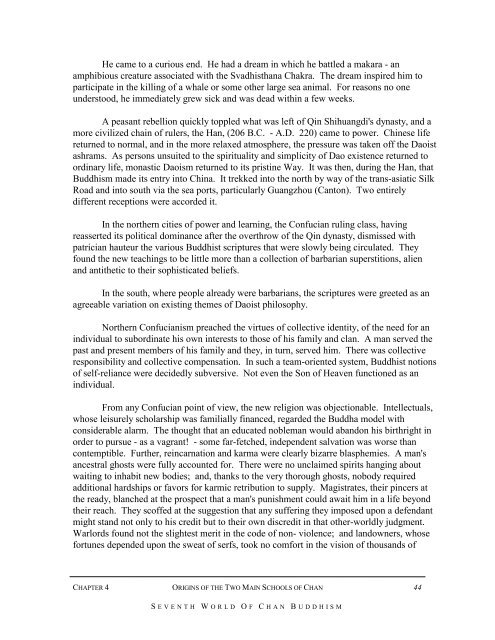seventh world of chan buddhism - Zen Buddhist Order of Hsu Yun
seventh world of chan buddhism - Zen Buddhist Order of Hsu Yun
seventh world of chan buddhism - Zen Buddhist Order of Hsu Yun
Create successful ePaper yourself
Turn your PDF publications into a flip-book with our unique Google optimized e-Paper software.
He came to a curious end. He had a dream in which he battled a makara - an<br />
amphibious creature associated with the Svadhisthana Chakra. The dream inspired him to<br />
participate in the killing <strong>of</strong> a whale or some other large sea animal. For reasons no one<br />
understood, he immediately grew sick and was dead within a few weeks.<br />
A peasant rebellion quickly toppled what was left <strong>of</strong> Qin Shihuangdi's dynasty, and a<br />
more civilized chain <strong>of</strong> rulers, the Han, (206 B.C. - A.D. 220) came to power. Chinese life<br />
returned to normal, and in the more relaxed atmosphere, the pressure was taken <strong>of</strong>f the Daoist<br />
ashrams. As persons unsuited to the spirituality and simplicity <strong>of</strong> Dao existence returned to<br />
ordinary life, monastic Daoism returned to its pristine Way. It was then, during the Han, that<br />
Buddhism made its entry into China. It trekked into the north by way <strong>of</strong> the trans-asiatic Silk<br />
Road and into south via the sea ports, particularly Guangzhou (Canton). Two entirely<br />
different receptions were accorded it.<br />
In the northern cities <strong>of</strong> power and learning, the Confucian ruling class, having<br />
reasserted its political dominance after the overthrow <strong>of</strong> the Qin dynasty, dismissed with<br />
patrician hauteur the various <strong>Buddhist</strong> scriptures that were slowly being circulated. They<br />
found the new teachings to be little more than a collection <strong>of</strong> barbarian superstitions, alien<br />
and antithetic to their sophisticated beliefs.<br />
In the south, where people already were barbarians, the scriptures were greeted as an<br />
agreeable variation on existing themes <strong>of</strong> Daoist philosophy.<br />
Northern Confucianism preached the virtues <strong>of</strong> collective identity, <strong>of</strong> the need for an<br />
individual to subordinate his own interests to those <strong>of</strong> his family and clan. A man served the<br />
past and present members <strong>of</strong> his family and they, in turn, served him. There was collective<br />
responsibility and collective compensation. In such a team-oriented system, <strong>Buddhist</strong> notions<br />
<strong>of</strong> self-reliance were decidedly subversive. Not even the Son <strong>of</strong> Heaven functioned as an<br />
individual.<br />
From any Confucian point <strong>of</strong> view, the new religion was objectionable. Intellectuals,<br />
whose leisurely scholarship was familially financed, regarded the Buddha model with<br />
considerable alarm. The thought that an educated nobleman would abandon his birthright in<br />
order to pursue - as a vagrant! - some far-fetched, independent salvation was worse than<br />
contemptible. Further, reincarnation and karma were clearly bizarre blasphemies. A man's<br />
ancestral ghosts were fully accounted for. There were no unclaimed spirits hanging about<br />
waiting to inhabit new bodies; and, thanks to the very thorough ghosts, nobody required<br />
additional hardships or favors for karmic retribution to supply. Magistrates, their pincers at<br />
the ready, blanched at the prospect that a man's punishment could await him in a life beyond<br />
their reach. They sc<strong>of</strong>fed at the suggestion that any suffering they imposed upon a defendant<br />
might stand not only to his credit but to their own discredit in that other-<strong>world</strong>ly judgment.<br />
Warlords found not the slightest merit in the code <strong>of</strong> non- violence; and landowners, whose<br />
fortunes depended upon the sweat <strong>of</strong> serfs, took no comfort in the vision <strong>of</strong> thousands <strong>of</strong><br />
CHAPTER 4 ORIGINS OF THE TWO MAIN SCHOOLS OF CHAN<br />
S EVENTH W ORLD O F C HAN B UDDHISM<br />
44


